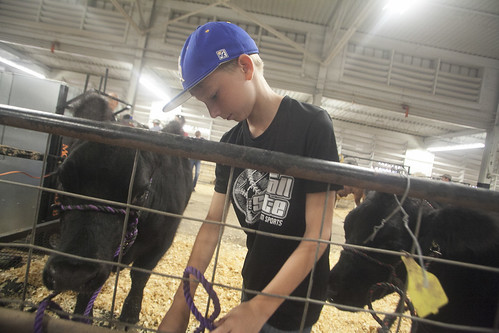4-H livestock programs help instill responsibility, camaraderie
By Ryan McGeeney
U of A System Division of Agriculture
Oct. 21, 2016
Fast Facts:
- Caring for show livestock instills responsibility in children
- Livestock, poultry showing a traditional part of 4-H
(440 words)
(Newsrooms: Download photos from the 2016 Arkansas State Fair at https://flic.kr/s/aHskLRKxBV)
LITTLE ROCK — As light rain and blustery winds lowered on the Arkansas State Fairgrounds this week, competitors and other participants in the fair’s cattle competition were undeterred, as a slow parade of heifers, steers and other cows were led through Barton Coliseum for a pre-competition weigh-in.
Larry Vincent, a cattle producer who lives and works near Malvern in Hot Spring County, said 2016 is the third year in a row he and his family have come to the Arkansas State Fair. As he helped 11-year-old Will Barton wrestle a heifer onto a scale Tuesday morning inside the coliseum, he explained how the weigh-in is a key part of the contest.
“If you’re showing commercial heifers or steers, you have to weigh them in,” Vincent said. “That’s how you show against weight — it’s not by age. If you’re showing animals that are true breeds, like Angus, you show against their birth dates.”
Vincent said one of the best dividends he’s seen from involving his family in livestock showing at county and state fairs is the responsibility it has instilled in his children.
“The fact that they’ve got to get out there every day, twice a day to feed and wash cows,” he said. “The responsibility level you see, and how much ownership they take of that. It’s the reason I got my kid involved in it.”
Linda Bates, Garland County Cooperative Extension Service 4-H agent, said youth involvement in livestock raising and competitions helped instill a strong sense of ownership and responsibility in the participants.
"When those kids walk into the arena with their animals, no matter what they do, what they have spent, or how much the parents have transported them to help prepare them, seeing the responsibility of the kids makes it all worth while," Bates said.
“They take care of their own animals, they help each other,” she said. “Whenever they see somebody having trouble getting their animal in, they run over and help them out. You see them carrying water, carrying feed, cleaning stalls — just taking care of business. Their parents are there, but the kids are the ones taking care of their animals at the fair.”
Total attendance at the 2016 Arkansas State Fair, which began Oct. 14 and will conclude Oct. 23, is expected to exceed last year’s total attendance of more than 473,000, according to fair administrators. So far, the highest-attended day of the 2016 fair was Saturday, Oct. 15, when more than 84,750 people visited the fairgrounds – which was also 4-H Day at the Fair.
To learn more about 4-H livestock competition programs, contact your local Cooperative Extension Service agent or visit Arkansas 4-H.
Pursuant to 7 CFR § 15.3, the University of Arkansas System Division of Agriculture offers all its Extension and Research programs and services (including employment) without regard to race, color, sex, national origin, religion, age, disability, marital or veteran status, genetic information, sexual preference, pregnancy or any other legally protected status, and is an equal opportunity institution.
# # #
Media Contact: Mary Hightower
Dir. of Communication Services
U of A Division of Agriculture
Cooperative Extension Service
(501) 671-2126
mhightower@uada.edu
Related Links
